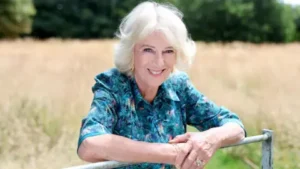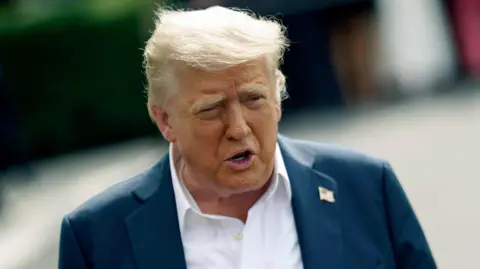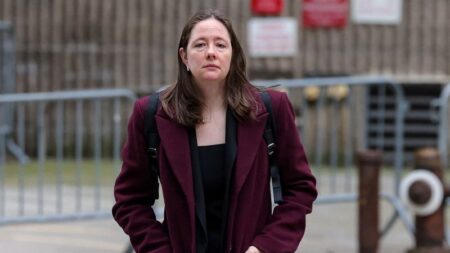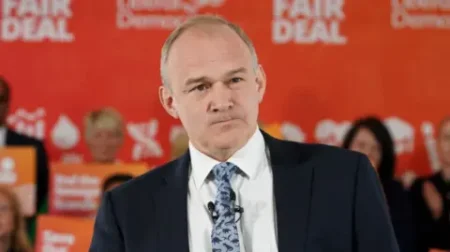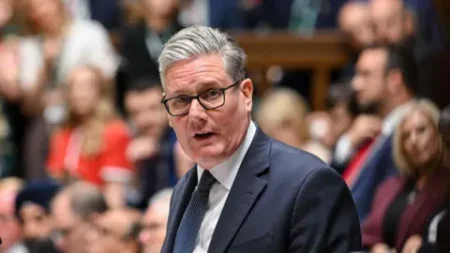In recent political discourse, Nigel Farage has openly criticized the decision regarding Donald Trump’s upcoming state visit, labeling it as “shoddy.” The controversy stems from Trump’s scheduled three-day trip to the United Kingdom beginning on September 17, shortly after the House of Commons goes on recess for the traditional party conference season. This arrangement raises questions about the timing of such significant diplomatic events, particularly in the context of Trump’s previous state visit in 2019, during which he also was not granted the opportunity to address Parliament.
Farage, the leader of Reform UK, has expressed disappointment that Trump will not be able to address Members of Parliament (MPs) during his visit. He characterized the timing of Trump’s trip as “cowardly,” suggesting that it reflects a preference of the Labour government to prioritize relations with European entities over robust ties with the United States. According to Farage, this choice underscores the government’s “real priorities,” arguing that the UK must maintain its alliance with America, especially in matters of trade and military defense through NATO. His belief is that Trump’s perspectives align more closely with British interests than those of other European leaders, including French President Emmanuel Macron, who had the opportunity for a full ceremonial visit.
While Downing Street has denied that the timing of Trump’s visit was deliberately orchestrated to coincide with Parliament’s recess, they assert that any questions regarding scheduling are matters reserved for Buckingham Palace. Traditionally, state visits are arranged in collaboration with the government. However, the current situation invites skepticism as to whether the scheduling was indeed fortuitous.
In historical context, addresses made by visiting dignitaries to both Houses of Parliament are far from guaranteed. Since 1952, around only 25% of state visits have included such addresses. Trump’s previous visit did not afford him this platform, and this could be indicative of ongoing sentiments within certain factions of the UK Parliament. Recently, Labour MP Kate Osborne had petitioned Commons Speaker Lindsay Hoyle to prevent Trump from speaking to Parliament. This sentiment is echoed by some MPs from the Labour Party and the Green Party, who signed a parliamentary motion expressing similar concerns.
Farage has acknowledged that inviting Trump to address Parliament could spark controversy, as “anything to do with Donald Trump results in a row.” Yet, he insists that Trump’s views foster a more pro-British sentiment compared to other world leaders, framing the US-UK alliance as vital for the preservation of British defense capabilities. The contrast drawn with Macron’s visit, which was acknowledged as a full ceremonial affair, emphasizes Farage’s opinion that the current government’s actions signal a preference for European relations over American ones.
In terms of logistics, the UK government has confirmed that there will be no special adjustments to the parliamentary calendar to accommodate Trump’s address. A spokesperson for Sir Keir Starmer dismissed any linkage between Trump’s visit and the recess dates, affirming that these arrangements are managed by the Palace in consultation with the president’s team. Nevertheless, during Trump’s visit, Starmer is expected to meet with him privately at his golf resort in Menie, Aberdeenshire, which adds layers of complexity to the political implications of this visit.
State visits are traditionally formalized through the monarch’s invitation, and they involve various governmental departments, typically the Foreign, Commonwealth and Development Office (FCDO). The ultimate decision regarding any parliamentary address lies with the Speakers of the Commons and the Lords, but it is typically also influenced by the government in power. During this visit, Trump’s accommodation will be at Windsor Castle instead of Buckingham Palace, which is undergoing renovations.
In conclusion, the absence of an address to Parliament by Trump during his state visit adds to ongoing discussions about the current British government’s foreign policy directions. With deep-rooted political undertones, this scenario highlights the complex interplay of international relations, domestic political sentiments, and the perceptions of leadership and authority on the global stage. As political dynamics evolve, the reactions generated by Trump’s presence in the UK will likely continue to evoke a spectrum of responses across various political camps.

